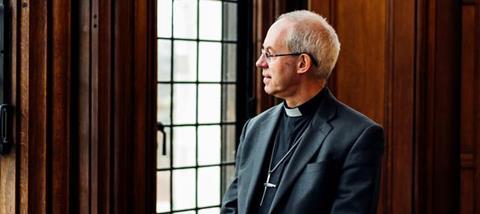
I became an evangelical Christian within the Protestant tradition about ten years ago. What I found in the Pentecostal church where I first came to faith that had never been apparent to me as a child growing up Catholic was a real understanding of what a close relationship with Christ looked like.
After a powerful encounter with the Holy Spirit, and seeing community and service lived out passionately by evangelical Christians, I didn’t feel I could go back to the denomination handed down to me by my family.
So when I read Justin Welby's interview in The Spectator - in which he said he didn’t mind if Anglican clergy became Catholic priests - something Anglicans have been able to do since the Ordinariate was established in 2011 – I was a little surprised.
It is estimated that 1 in 10 Catholic Priests used to be an Anglican vicar. When this was put to Archbishop Justin, he replied: "Who cares? I don’t mind about all that. Particularly if people go to Rome, which is such a source of inspiration...As long as you are following your vocation, you are following Christ. It’s just wonderful. What we need is for people to be disciples of Jesus Christ. I don’t really care whether it’s the Church of England or Rome or the Orthodox or Pentecostals or the Lutherans or Baptists. They are faithful disciples of Christ."
The Archbishop’s comments will be welcomed by many, I’m sure, and there is much to be commended in what he has to say. Church unity is important and the things we have in common far outweigh our differences.
From my own experience, some of the most inspiring, devoted followers of Jesus that I have had the privilege of meeting have been Catholics. From a bishop ministering to AIDS sufferers in a South African slum, to Filipino nuns educating the children of factory workers in Cambodia and even a cardinal preaching passionately about freedom of religion in a country hostile to Christians. When it comes to mission the Catholic Church in the developing world is a jewel in the Church’s crown.
But what we see in the UK is a different matter.
The kind of churches I grew up in were led by generally kind, elderly men who loved God but didn’t have the energy or resources to galvanise their parishes. Sermons were short, vague and tangential and the youth work was practically non-existent. I didn’t receive any meaningful discipleship, wasn’t encouraged to read my Bible and wasn’t involved in many other church activities outside Mass on a Sunday. Apart from the odd Barn Dance, there wasn’t any regular activities for people my age.
The Catholics we knew were friendly, considerate, good people, who held strong Christian values, but few spoke openly of prayer or walking with God. It seemed that ‘God’ was something you did on a Sunday and faith a private affair.
I agree with Welby’s opinion that it doesn’t matter what denomination you’re part of as long as you’re following Christ, but, in my experience many Catholic churches are doing a poor job of nurturing the faith of Christians and encouraging them to live radical gospel-focused lives.
No denomination has the monopoly on truth and we can all learn from one another. Perhaps Welby is hoping the Anglicans who move to the Catholic Church might take with them some of the positive values and ways of thinking which are currently more prevalent in Anglicanism than Catholicism? I certainly hope so. But my fear is the influence might flow in the opposite direction.
While applauding the Archbishop for his concern for Christian unity, we should also acknowledge the Reformation did happen for a reason and there are are serious differences between the two churches. To take just one example, the belief in sola scriptura (Latin for "scripture alone") means that Protestant churches, at least in my experience, are more likely to actively teach Christians to read the Bible for themselves, and make this a daily habit. This kind of teaching, which I've only encountered in more evangelical churches, has helped make my Christian faith come alive.
We should applaud Archbishop Welby for his passion for Christian unity. But there's a fine line between encouraging and acknowledging the good we see in other expressions of Christianity and suggesting that the doctrinal and practical differences which exist are irrelevant and immaterial. Personally, I'm glad I moved in the direction that I did.
Enjoyed that? Get more articles covering news, culture, faith and apologetics in every print issue of Premier Christianity magazine. Subscribe now for HALF PRICE (limited offer)




























